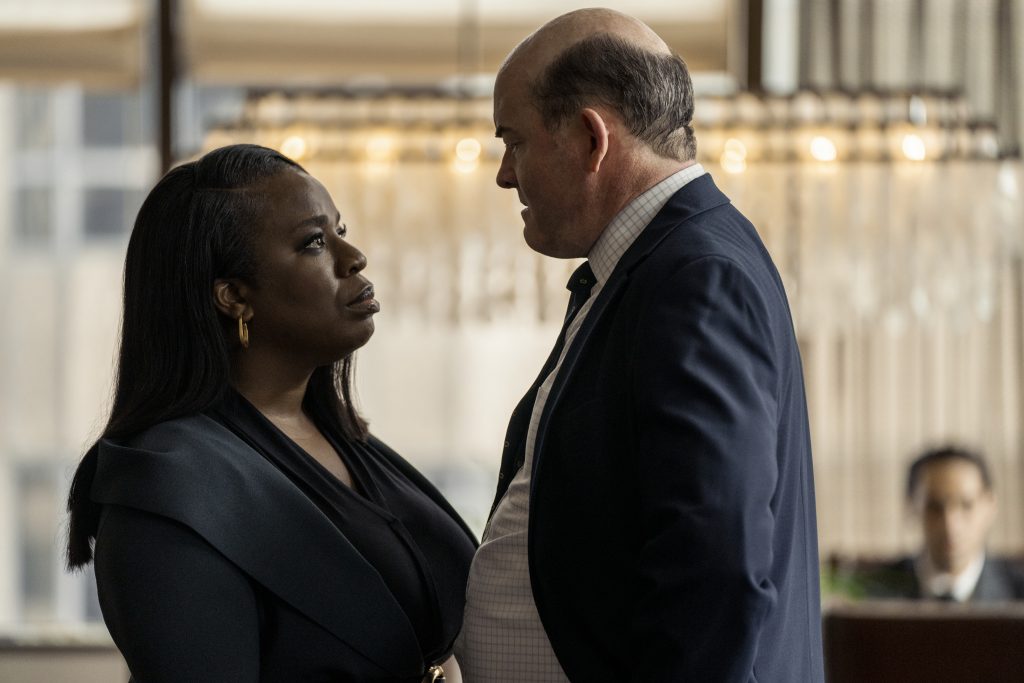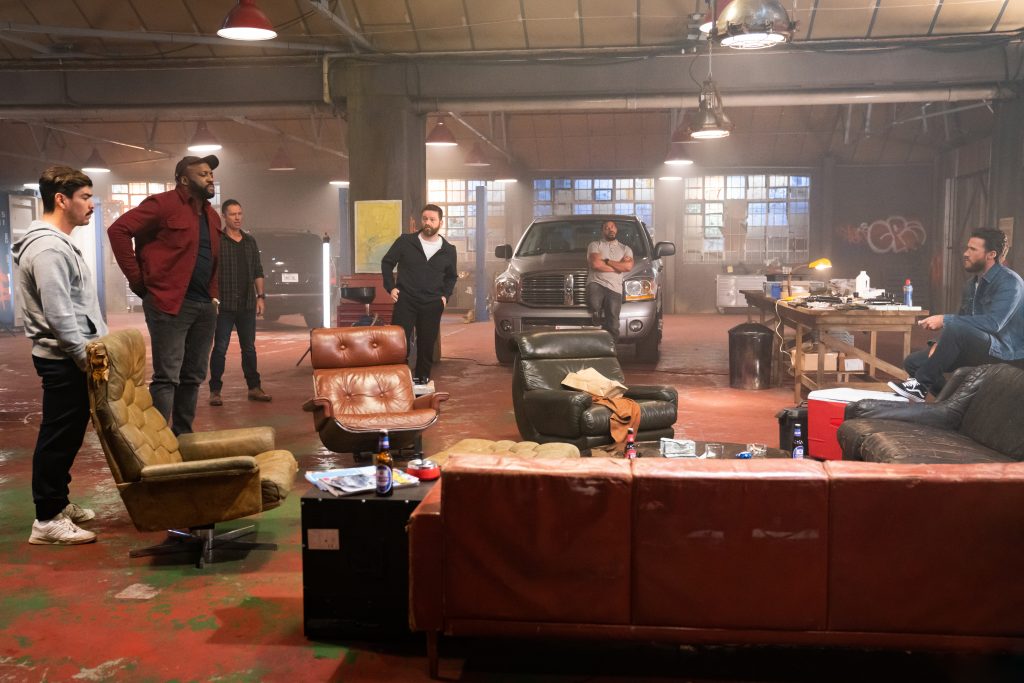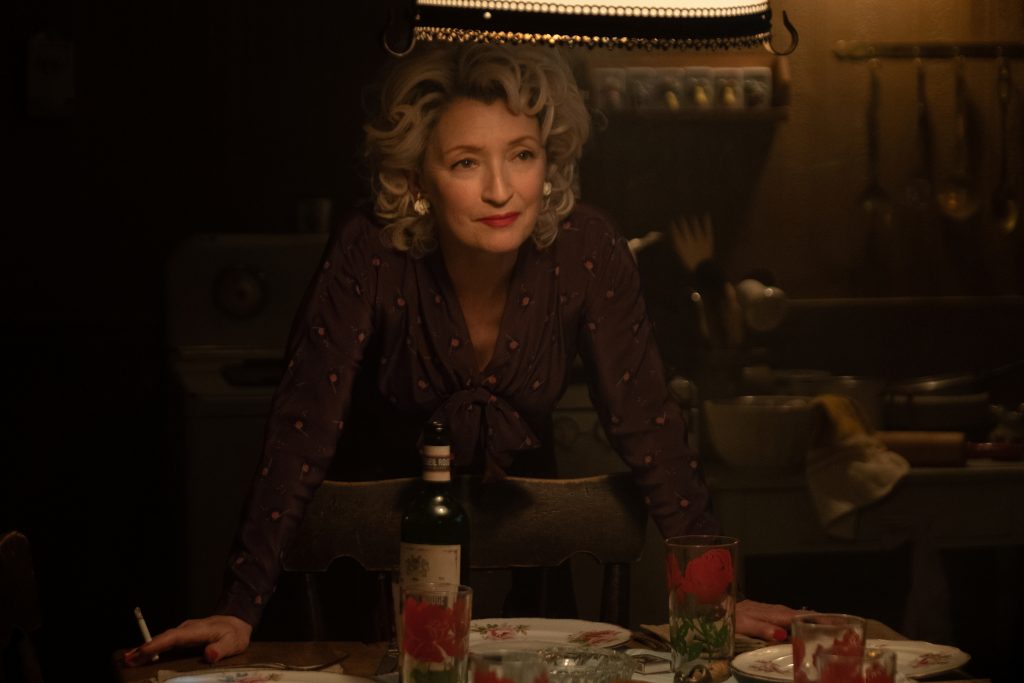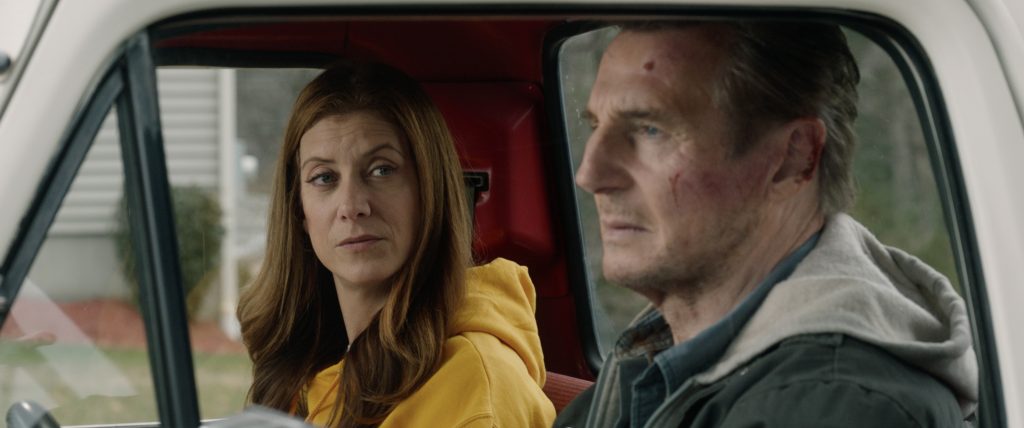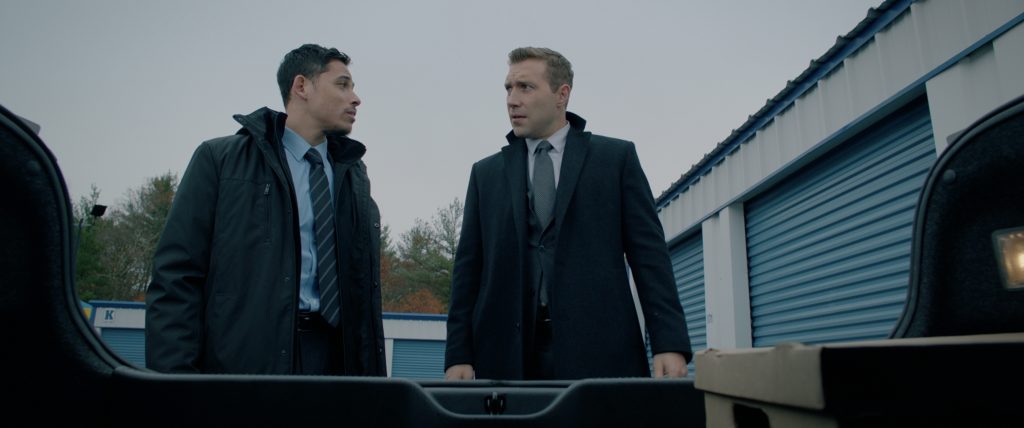January 26, 2022
by Carla Hay
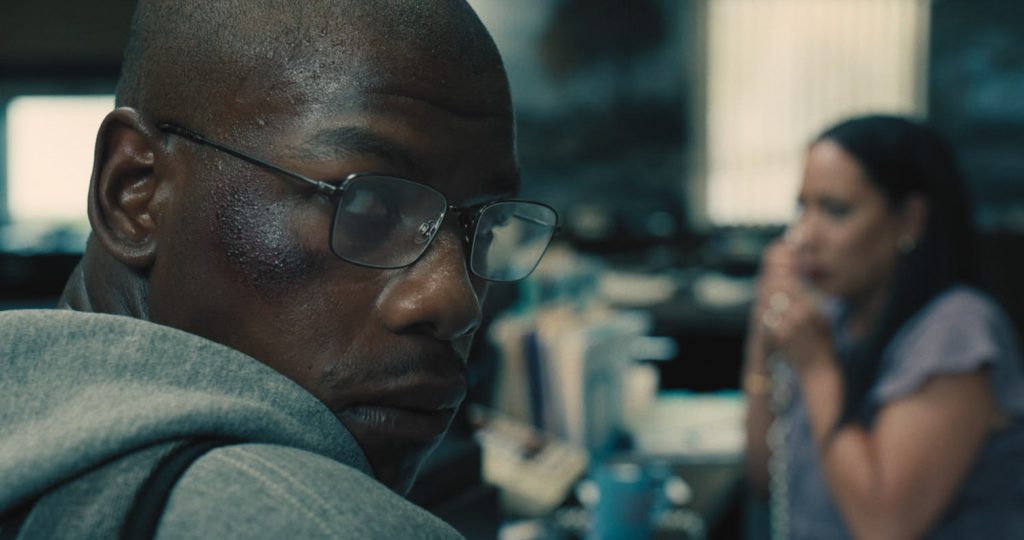
[Editor’s Note: After this movie premiered at the 2022 Sundance Film Festival, Bleecker Street acquired the movie and changed the movie’s title from “892” to “Breaking.”]
Directed by Abi Damaris Corbin
Culture Representation: Taking place primarily in Marietta, Georgia, the dramatic film “892” features a cast of African American and white characters (with a few Latinos) representing the working-class and middle-class.
Culture Clash: A former U.S. Marine, who’s an Iraq War veteran, takes hostage of a bank in order to get the $892.42 that he says the U.S. Department of Veterans Affairs owes him.
Culture Audience: “892” will appeal mainly to people who are interested in suspenseful but formulaic movies with themes about how U.S. veterans are treated by the government, as well as racial inequalities in the criminal justice system.

The suspenseful drama “892” leaves some major questions unanswered, but the message of this movie is loud and clear: “The U.S. government needs to improve how military veterans are treated by the system.” John Boyega gives a riveting performance in a movie that’s sometimes hampered by hostage movie clichés, underdeveloped characters and not enough empathy for the hostage victims. “892” had its world premiere at the 2022 Sundance Film Festival.
Based on true events, “892” is the second feature film directed by Abi Damaris Corbin, who co-wrote the “892” screenplay with Kwame Kwei-Armah. The screenplay is based on Aaron Gell’s 2018 Task & Purpose article “They Didn’t Have to Kill Him.” It’s a movie that takes some shortcuts in telling a story that puts more emphasis on showing the stress and intensity of a hostage situation instead of giving a well-rounded view of the people who were directly involved in this crisis.
The movie is told mostly from the perspective of a former U.S. Marines lance corporal who takes hostage of a Wells Fargo bank in Marietta, Georgia. This Iraq War veteran is angry and frustrated that the U.S. Department of Veterans Affairs, also known as the VA, has withheld payment of $892.42 that he says he has a right to have. In real life, this hostage incident took place on July 17, 2017. And this distraught former military man was Brian Brown-Easley, a 33-year-old divorced father of an elementary-school-aged daughter.
Boyega portrays Brian Brown-Easley with a mixture of compassion, sorrow and ferocity in how this doomed military veteran expresses himself and interacts with the people around him. Most of the movie is told in “real time” during this bank standoff, but there are a few flashbacks that give some (but not enough) information on what led Brian to commit such a desperate act. The movie shifts perspectives mainly when it shows what’s happening outside of the bank during this standoff, as one person involved has somewhat of a breakthrough in emotionally connecting with Brian.
The beginning of the movie shows that Brian appears to be a devoted father to his daughter Kiah (played by London Covington), who’s about 6 or 7 years old. As they spend time together talking on the phone, they have a father-daughter joke about the “Lord of the Rings” villain creature Gollum and the character’s grotesque physical appearance. Brian is putting up a happy front for Kiah, but his life is really falling apart.
Brian is living in a motel, which is about to evict him for non-payment. It’s one of the reasons why Brian is so angry that he can’t get the $892.42 benefits payment that he says that the VA is wrongfully withholding from him. A flashback shown later in the movie reveals that this payment was denied to Brian because the VA was paying for Brian’s college tuition, but VA records show that he stopped attending the college, so the VA withheld payment to compensate for the college tuition. Brian insists it’s a case of mistaken identity.
About 10 minutes into the movie, Brian is shown holding the bank hostage, so viewers don’t get to know much about Brian in the beginning of the film. Brian walks into the bank while he’s carrying a backpack, and he calmly interacts with a bank teller to withdraw $25 from his bank account. He has a friendly bank teller named Rosa Diaz (played by Selenis Leyva), who is chatty and helpful. But after Brian gets his $25, he shows her a note that says, “I have a bomb.” And that’s when things take an ominous turn.
A quick-thinking bank manager named Estel Valerie (played by Nicole Beharie) notices that Rosa seems very anxious with Brian. Estel immediately figures out that some kind of robbery or threat is in progress, so she’s able to discreetly get most of the employees and all of the customers out of the bank. The bank isn’t that crowded, but it’s a bit of an “only in a movie” stretch that one person was able to do all of this so quickly without the hostage taker noticing that the bank is being evacuated.
The bank is evacuated to the point where Estel and Rosa are the only hostages during this standoff. There are repetitive scenes where Brian shouts to anyone who’ll listen some variation of this threat: “I’m going to kill myself and everybody in here if my demands are not met!”
He also insists on having Estel and Rosa call as many media outlets as possible because he wants his “mission” to get as much publicity as possible. “Fraud was committed! My disability check was stolen from me, and I want it back!” Brian shouts. Rosa and Estel both try to appease Brian by telling him that they can give him as much money as he wants from the cash in the bank. However, he adamantly refuses to accept any money that isn’t directly from the VA.
Meanwhile, just like Brian wanted, there ends up being live media coverage of the standoff, especially after Brian gets on the phone for a live conversation with WSB-TV producer Lisa Larson (played by Connie Britton), who tries to give Brian the impression that she’s on his side and wants him to safely get him what he’s demanding. Brian goes back and forth in deciding whether he can trust Lisa or not. Even though his hostage plan/bomb threat might be foolish, he’s smart enough to know that Lisa’s main agenda is to get as much out of this story as she can as a TV producer.
While all of this chaos is happening, there’s a section of the movie where the authorities and Brian have trouble reaching his ex-wife Cassandra Brown-Easley (played by Olivia Washington), who is fast-asleep (she works the night shift and is exhausted) and not answering her phone. When she does find out what’s happening, she seems curiously and inexplicably emotionally detached, which could be interpreted as shock. Viewers will get the impression that when Cassandra first hears that Brian is responsible for this hostage crisis, her attitude is, “Well, he’s my ex-husband, so he’s not my problem.”
However, Cassandra seems to already think the worst possible outcome will happen. Whenever law enforcement contacts her about Brian during this crisis, her first question is usually: “Is he dead?” This movie presents Cassandra as an ex-wife who doesn’t have much information to divulge about Brian and why he would commit these crimes.
Cassandra does have a very heavy emotional moment later when the reality of the situation sinks in, but for some parts of the movie, she doesn’t act like a mother who’s too concerned about how this crisis will affect her daughter. For example, she lets Kiah watch the TV news to see what’s happening with the standoff. You don’t have to be a parent to know that it would be very traumatic for a child to watch this type of news coverage that could end with the child seeing a parent killed or arrested on TV.
Brian seems to know that even if he does get the money that he says is owed to him, getting arrested or killed are the only two realistic outcomes for him. He doesn’t seem all that concerned about having an escape plan, because he knows it would be pointless. And what about the two women who are being held hostage? Brian assures them: “If I die today, I die alone.”
The issue of race comes up occasionally during this hostage crisis—not as as an excuse or explanation, but to show that Brian is all too-aware that because he’s African American, he’s less likely to survive law enforcement’s reaction to what he’s doing. Shortly after Estel (who is African American) and Rosa (who is Afro-Latina) are taken hostage, Brian asks Estel if the bank has been robbed before. She says yes, and the robber was arrested. Brian says, “They didn’t kill him? He got to be white.”
Unlike most hostage takers, Brian insists on having a hostage negotiator. A small army of law enforcement is stationed outside and near the bank, including members of the Marietta Police Department, the Cobb County Sheriff’s Office and the FBI. Some of them argue about who’s going to take the lead in the negotiations.
In the end, Eli Bernard (played by Michael Kenneth Williams), a sergeant with the Marietta PD, becomes the chief negotiator. Eli also happens to be an African American and a former Marine, just like Brian, so they bond over this shared identity. Eli often calls Brian “brother” and is the only one during the standoff who come closest to gaining Brian’s trust. (“892” is one of the last on-screen roles for Williams, who died of a drug overdose in 2021.)
The movie spends a lot of time trying to garner sympathy for Brian. And there’s no doubt that Boyega’s impactful performance is the main reason to watch “892.” However, all of this emphasis on Brian comes at the expense of sidelining the thoughts and feelings of all the other characters. Beharie shows some grit in her performance of Estel, who is more composed during this crisis than panic-stricken Rosa. However, Estel and Rosa are not shown as fully developed people. They’re just hostage victims who react to what Brian does and what he wants.
All the people outside of the bank are essentially the types of characters that have been in plenty of other hostage movies. Lisa is the ambitious and shrewd media person. Eli is the sympathetic “good cop.” And there’s the predictable “trigger happy” law enforcement officer Major Riddick (played by Jeffrey Donovan), who would rather have the hostage taker dead at the end of the ordeal instead of alive. The role of Major Riddick is quite generic and only in the movie so that Eli inevitably has someone to clash with over authority issues and negotiation tactics.
Even though the movie succeeds in keeping a suspenseful tone throughout, there are some inconsistencies in the storytelling. At one point in the movie, Brian is described as someone who’d never been in trouble with the law before, based on background checks that are done when he’s identified as the hostage taker. But then, there’s a flashback scene of Brian being handcuffed by police officers while he’s having a meltdown in a VA office because he can’t get his money.
Perhaps the movie’s biggest shortcoming is in how “892” avoids discussing mental health. Viewers won’t find out if Brian had a mental illness that was diagnosed or undiagnosed. And if he did have any mental illness, how long did he have it? Was he getting treatment for it? Those questions remain unanswered in the movie.
People can certainly speculate that as a war veteran, Brian might have had post-traumatic stress disorder. However, someone just doesn’t go into a bank and commit this type of horrifying act just because they want $892 from the government. Brian says he wants the media coverage to bring attention to the VA’s mistreatment of veterans, but it’s obviously illogical and wrong to try to get attention for this issue by holding innocent people hostage and threatening to blow up a building.
Details about Brian’s personal life are also not fully explained. Brian hints that he’s mainly responsible (or at least he blames himself) for his divorce from Cassandra, but the details over why they got divorced are never mentioned in the movie. Brian also says that he has an estranged brother, but his parents or other relatives aren’t even mentioned. Brian is obviously a loner, so he has no friends who can offer any insight. During this crisis, Cassandra is the only person in Brian’s family who is contacted.
All of this gives some skimpy background information that might explain why Brian felt he had no one that he could turn to for help. However, it doesn’t explain why Brian wasn’t thinking of his daughter when he committed an act that would result in Brian being taken away from her. It can be left up to interpretation that Brian subconsciously wanted a “suicide by cop” situation, but the movie doesn’t seem too interested in addressing mental health as a reason for why someone would do what Brian did. By leaving out these mental health issues, “892” could have come very close to portraying Brian as a negative and hollow stereotype of an “angry black man,” if not for Boyega’s nuanced performance.
“892” doesn’t frame Brian’s actions as a heroic “one man versus the system” story, but rather as a tragedy whose outcome probably would have been different if Brian had been white. There are moments in the movie where Brian seems to understand that his irreversible actions will cause a lot of emotional damage to his daughter Kiah. However, those moments are few and far in between, because the movie is mainly concerned about making Brian the person who should get the most sympathy in this tragedy. It’s debatable whether or not all of that sympathy is deserved.
Another shortcoming in “892” is how the movie has a trivial way of showing the traumas that Estel and Rosa have to deal with after the standoff is over. As a hostage thriller, “892” certainly delivers when it comes to creating tension-filled scenes. Some of the scenarios seem too contrived for a movie though, just for the sake of dragging out the story so that Brian can get more agitated and start yelling again. It’s the type of hostage film where the movie’s message is made very clear, but viewers still won’t know much about the hostage taker when the movie is over.
UPDATE: Bleecker Street will release “Breaking” (formerly titled “892”) in U.S. cinemas on August 26, 2022.


